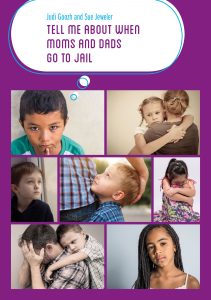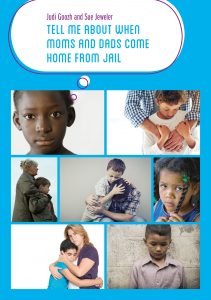Judi Goozh is a retired award-winning speech-language pathologist. Sue Jeweler is a retired award-winning, Who’s Who listed teacher. Judi and Sue were nominated for the 2013 White House “Champions of Change” award. Their books, Tell Me About When Moms and Dads Go To Jail and Tell Me About When Moms and Dads Come Home From Jail come out on May 21. For more information or to purchase your copies, click here.
Our educational experience taught us to “get to know the whole child” in our work. As teachers, we found children struggling academically, socially or emotionally as a consequence of their family situations. If there was a divorce or death or deployment, the school counselor always provided us with resources. Unfortunately, there were no materials for children if they had an incarcerated parent. Thus began our mission to create books that would support these children, their families, and the professionals who serve them.
Children, who are victims of their parent’s crimes, are often afraid and confused by the changes in their own lives. Research showed us that children with an incarcerated parent are impacted socially (acting out behaviors, friendship problems, communication), emotionally (depression, anger, confusion, feelings of abandonment), and academically (attention, concentration, learning issues, poor grades). We learned that on any given day more than 7 million children may have a parent in prison or jail or under parole or probation supervision and that, without effective intervention strategies, as many as 70 percent of children of incarcerated parents may become involved with the criminal justice system. We also learned that parental incarceration is associated with a two-fold increase in risk for mental health problems in affected children and that multiple issues face families when the formerly incarcerated person returns home.
Our book, TELL ME ABOUT WHEN MOMS AND DADS GO TO JAIL, presents a scenario about a child who witnesses the arrest of a parent and includes questions that are asked by the child and answered throughout the process from arrest to incarceration. The second book, TELL ME ABOUT WHEN MOMS AND DADS COME HOME FROM JAIL, tells a different story about a child who finds out his dad is arrested and, after spending time in jail, is coming back home. The child has many questions about what will happen and, throughout the story, his questions are answered. Even though the stories are about a child and his dad, the same story, questions, and answers are true for a child whose mom is arrested and, after spending time in jail, comes home. Both books include activities for children and tips for parents and professionals on topics including: jail visitation guidelines, handling conflict, communication strategies, and a list of resources and further reading.
In addition to writing the books, we have given presentations to educators, counselors, psychologists, social workers, criminal justice personnel, pediatricians, child welfare personnel, foster parents, public librarians, and White House senior staff members. We help audience members recognize the fact that they may have contact with children and families through their jobs but also as neighbors and even within their families. Our message includes actions we all can take to make a difference for these children:
- Re-think our own preconceived ideas and stereotypical attitudes about crime, the incarcerated parent, the family and the idea that the child will probably follow in this downward path.
- Educate others.
- Be compassionate. Help break the cycle – do not assume nothing can be done.
- Make sure that children who have an incarcerated parent are properly assessed and supported.
- Give appropriate support during the initial period of adjustment and throughout the process of reunification.
- Prompt open discussions with either the parent or the child in a safe, caring, and confidential way and have the child or parent talk about their experiences, and help them to deal with the emotions and consequences that follow incarceration.
- Encourage the parent to come to the school to tell the counselor, the principal, the teacher or the case manager that his/her spouse has been arrested. In addition, it is important to get the parent to give permission to talk to the child.
- Encourage and investigate cross collaboration among different agencies in the community such as social service providers, pediatricians, and other mental health agencies.
It has been said, “A man’s family serves his time with him.” Our goal has been to build awareness and sensitivity to the situation that children of incarcerated parents find themselves in, through no fault of their own.
Visit our website to learn more about this issue and our work:
http://www.creativefamilyprojects.org

